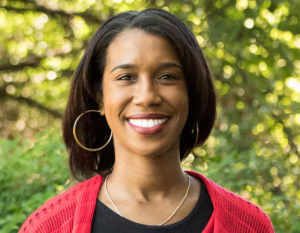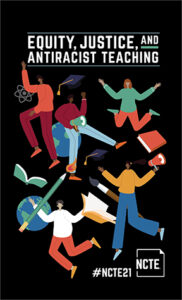This post was written by NCTE member Stephanie Toliver.
I attended my first NCTE Annual Convention in the fall of 2016. A new PhD student who had never attended a conference in her life, I was nervous, scared of being the lone attendee who had no networking skills and had no academic friends to meet up and get coffee with. The first day, I hid myself, an invisible ghost walking among the vibrant conferencegoers, hoping that no one noticed I was there. I sat through a few sessions, but I wasn’t sure what to do while there—Do I take notes? Do I ask questions? Is it polite to ask the person next to you what those acronyms mean? Is it polite to speak at all?
Sitting in the corners of vibrant, joyous conference rooms, I wondered if this place was for me, if this place could be my academic home.
That night, I called my mother because she was the only person who could ground me when my mind ventured into fanciful spaces of isolation. Her question was simple: are there any places for new people, places where you can meet people who might feel just as alone as you do?
After pondering her question, I remembered that there was a new-member gathering the next morning. With resolve, I decided to attend, and it was one of the best decisions I have ever made. At the gathering, I met Anna J. Roseboro, an esteemed educator who has been a staple at the NCTE Convention for years. She told my group about aspects of the Convention I had not considered. Specifically, she told us about the American Indian, Asian/Asian American, Black, Jewish, and Latinx Caucuses, as well as the Elementary, Middle, Secondary, and College-level Sections.
She explained that these spaces were created to connect people who had the same interests, who were located at the same teaching level, and who shared similar identity positions. She told us to watch for the scholars involved in the Cultivating New Voices Among Scholars of Color (CNV) program, as they were leading the field in critical approaches toward English education. She alerted us to NCTE’s activism by showing us where to find the policy briefs that explore important issues affecting ELA teachers and students. That hour at the welcome breakfast changed everything for me.
After breakfast, I googled “NCTE CNV,” browsed through the names of some of the most recent scholars on that list, and then searched for their names in the program. While perusing the Convention schedule, I noticed several names from the CNV list: Tamara Butler, April Baker-Bell, Roberta Price Gardener, Gholdy Muhammad, Yolanda Sealey-Ruiz. In name only, I didn’t know who they were, but the sessions they were leading and co-leading called to me. They talked of Black healing, Black life, Black vibrance. They called for justice, for change, for truth. They told the stories of their research, showing me that scholarly presentations could be narrative spaces. They challenged the audience to engage in self-reflection during the presentation and helped us process our reflections by having us turn and talk to our neighbors.
One conversation with an NCTE member during breakfast led me to spaces where I felt like I belonged, where I felt like I could be a scholar, too. A few sessions at this Convention helped me to see that NCTE could be my academic home, the place I want to share my research, my stories.
I’ve been to almost every NCTE Annual Convention since then, and every year, I am amazed by the thoughtfulness of the presentations, the increased activism in the conference calls, and the excitement on the faces of conference goers.
I still like to find my pockets of isolation, and I still worry about my general lack of networking skills, but NCTE has provided me with a safe place to exist, a welcoming space that finds those of us who feel alone and welcomes us home.
 Stephanie R. Toliver is an assistant professor of literacy and secondary humanities at the University of Colorado, Boulder. Informed by her love of science fiction and fantasy texts as well as her experience as a ninth- and tenth-grade English teacher, Toliver’s scholarship centers the freedom dreams of Black youth and honors the historical legacy that Black imaginations have had and will have on activism and social change. Her academic work has been published in several journals, including Journal of Literacy Research, Journal of Children’s Literature, Journal of Adolescent and Adult Literacy, and English Journal. Her public scholarship has been featured on LitHub, Huffpost, and the Horn Book. Toliver is the 2021 recipient of the NCTE Promising Researcher Award.
Stephanie R. Toliver is an assistant professor of literacy and secondary humanities at the University of Colorado, Boulder. Informed by her love of science fiction and fantasy texts as well as her experience as a ninth- and tenth-grade English teacher, Toliver’s scholarship centers the freedom dreams of Black youth and honors the historical legacy that Black imaginations have had and will have on activism and social change. Her academic work has been published in several journals, including Journal of Literacy Research, Journal of Children’s Literature, Journal of Adolescent and Adult Literacy, and English Journal. Her public scholarship has been featured on LitHub, Huffpost, and the Horn Book. Toliver is the 2021 recipient of the NCTE Promising Researcher Award.
It is the policy of NCTE in all publications, including the Literacy & NCTE blog, to provide a forum for the open discussion of ideas concerning the content and the teaching of English and the language arts. Publicity accorded to any particular point of view does not imply endorsement by the Executive Committee, the Board of Directors, the staff, or the membership at large, except in announcements of policy, where such endorsement is clearly specified.
Learn more and register for the
2021 NCTE Annual Convention,
November 18-21!


